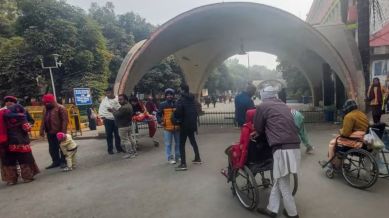Stay updated with the latest - Click here to follow us on Instagram
Cough, fever, body ache: H3N2 flu cases spike in Delhi; doctors say symptoms more severe this year
H3N2, a respiratory illness, can spread through coughing, close contact with infected individuals, and touching contaminated surfaces.

Delhi and its neighbouring cities are witnessing a rise in H3N2 cases — an Influenza A subtype virus — over the past few months, with doctors cautioning that symptoms this time are more intense than in previous years.
“There are two spikes in flu cases every year — one during the monsoon and the other in winter. The symptoms include body ache, cough, and fever with increased severity,” said Dr Sumit Ray, Head of Critical Care Medicine and Medical Director at Holy Family hospital, Delhi.
He added that H3N2, a respiratory illness, can spread through coughing, close contact with infected individuals, and touching contaminated surfaces.
Highlighting the surge in H3N2 cases, Dr Ray said, “In August, the hospital recorded nearly 80 positive cases, and September alone saw nearly 100 new cases. However, only 5 or 6 positive cases were reported in June and July. More than a hundred patients had to be admitted in these two months.”
On the vulnerable populations, Dr Ray noted that the flu severely affects the elderly and individuals with lung-related comorbidities such as diabetes or those who are immunocompromised. “These individuals may experience more serious illness or greater lung damage. Sometimes, a secondary bacterial infection can be added to the underlying influenza infection,” he added.
Dr Chatterjee, Senior Consultant in Internal Medicine at Indraprastha Apollo hospital, Delhi, echoed the same. “Apart from comorbidities like diabetes, heart disease, and kidney disease, people who have undergone transplants are also contracting the flu,” he said.
Doctors noted that symptoms may persist for several days or even weeks. “The virus typically remains in the body for 5–7 days, but symptoms can linger longer,” Dr. Ray explained. Patients with Chronic Obstructive Pulmonary Disease (COPD), asthma, or those who are heavy smokers may take up to three weeks to fully recover from the cough, he added.
Many individuals are not tested when symptoms are mild, especially if they are young and healthy without any underlying conditions, Dr Ray noted.
Dr Chatterjee attributed the rise in Outpatient Department (OPD) cases to increased testing and awareness following the COVID-19 pandemic. “Although symptoms are severe, the mortality rate remains low,” he added. Though Dr Ray said that the cases have seen a dip in the last week or so, Dr Chatterjee cautioned that the cases could spike again.
However, Dr Jugal Kishore, Director Professor at Vardhman Medical College and former Head of the Community Medicine Department at Safdarjung hospital, noted that it is difficult to confirm whether H3N2 cases are increasing or not. “Due to inadequate surveillance, it’s hard to determine if there’s a spike. Sometimes, people treat it as a routine viral infection, and even if tested, it may not necessarily be H3N2,” he said.
“Vaccines are available against influenza, which include antigens prevalent in the last circulation of the flu. These can offer protection in the next cycle or reduce the severity of illness,” he added, urging elderly individuals and those with comorbidities to get vaccinated.